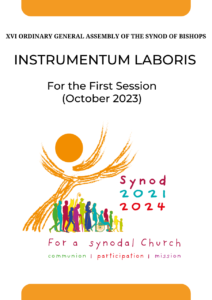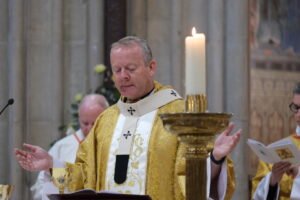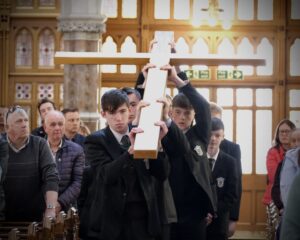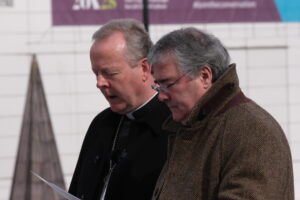Ara Coeli
Cathedral Road
ARMAGH BT61 7QY
Tel (028) 3752 2045
Fax (028) 3752 6182
Email: [email protected]
Administrative Staff:
Mrs Caroline Hicks
[email protected]
Mrs Donna Gray
[email protected]
Mrs Kathy Lennon
[email protected]
 I welcome the publication yesterday, June 20th, of the Instrumentum Laboris (IL), for the first session of the Synod in October with the theme “For a Synodal Church: Communion, Participation and Mission.
I welcome the publication yesterday, June 20th, of the Instrumentum Laboris (IL), for the first session of the Synod in October with the theme “For a Synodal Church: Communion, Participation and Mission.
The description given to the Document for the Continental Synod (DCS) is also valid for the IL. It “is not a document of the Church’s Magisterium, nor is it the report of a sociological survey; it does not offer the formulation of operational indications, goals and objectives, nor a full elaboration of a theological vision”. This is because it is part of an unfinished process. The IL, however, takes a step beyond the DCS. It draws from the insights of the first consultative phase but also from the work of the Continental Assemblies and articulates some of the priorities that emerged from listening to the People of God. Crucially, the IL avoids presenting them as assertions or stances. Instead, it expresses them as questions addressed to the Synodal Assembly.
The Synodal Assembly will have the task of discerning the concrete steps which enable the continued growth of a synodal Church. These steps will then be submitted to the Holy Father. Through this method of active listening each group will have something to learn, the faithful people, clergy, College of Bishops, and the Bishop of Rome, as they all listen to one another and to the Holy Spirit, “to know what He ‘is saying to the Churches’ (Rev 2:7)”. In this light, the purpose of the IL is not to be a first draft of the Final Document of the Synodal Assembly, rather, it outlines an initial understanding of the synodal dimension of the Church on the basis of which further discernment can be made. The IL was made public to encourage participation in the synodal process at the local and regional levels, while waiting for the outcome of the October Assembly. It provides further material on which the local Churches will be called to pray, reflect, act and make their own contribution.
Section A of the IL outlines a series of fundamental characteristics or distinguishing marks of a synodal Church. It then articulates the awareness that a synodal Church is also marked by a particular way of proceeding. The first phase of the synodal process has shown us that spiritual conversations are the way to continue. Section B of the IL, “articulates, in the form of three questions, the priorities that most strongly emerge from the work of all the continents, thus placing them before the Assembly for discernment”. Five worksheets are prepared for each of the three priorities, allowing them to be approached from different perspectives.
What has emerged strongly from all the continents is an awareness that “a synodal Church is founded on the recognition of a common dignity deriving from Baptism, which makes all who receive it sons and daughters of God, members of the family of God, and therefore brothers and sisters in Christ, inhabited by the one Spirit and sent to fulfil a common mission”. Baptism then is the foundation of true co-responsibility among all the members of the Church, “which is manifested in the participation of all, with the charisms of each, in the mission of the Church and the building up of the ecclesial community”. As awareness of this understanding of baptism increases so does the desire for a Church that is truly synodal in its institutions, structures, and procedures. A synodal Church is a Church where co-responsibility for mission is affirmed, exercised, and practiced. In such a Church the exercise of authority is seen, not as an obstacle, but as a gift. It is modelled on the ministry and service of Jesus who stooped to wash the feet of his disciples (Jn 13:1-11).
The IL poses fifteen questions for the members of the synod to reflect on communion, participation, and mission. These questions cover various topics such as social justice, care for our common home, ecumenism, ministry, authority, decision making, discernment, the role of women, collegiality etc. They will open an interesting and important debate on the future of our Church in a challenging and rapidly changing world. I pray for the success of the synod and the creation of a respectful atmosphere where the issues can be debated in a prayerful and reflective way.
Bishop Michael Router
Auxiliary Bishop of Armagh
The IL can be found at:
(All quotes in the above statement are from the foreword of the Instrumentum Laboris)
Archbishop Eamon Martin welcomes Pope Francis’ Good Friday Agreement anniversary prayers
 I am very pleased that today, to mark the anniversary of the Belfast/Good Friday Agreement, Pope Francis has included a prayer for lasting peace and harmony in Ireland during today’s Regina Coeli Queen of Heaven prayer at Saint Peter’s Bascilica, Rome. The Holy Father has shown great interest in our peace process and is always anxious to be kept up-to-date with developments here. I am confident that his prayerful thoughts today will be welcomed by all people of goodwill.
I am very pleased that today, to mark the anniversary of the Belfast/Good Friday Agreement, Pope Francis has included a prayer for lasting peace and harmony in Ireland during today’s Regina Coeli Queen of Heaven prayer at Saint Peter’s Bascilica, Rome. The Holy Father has shown great interest in our peace process and is always anxious to be kept up-to-date with developments here. I am confident that his prayerful thoughts today will be welcomed by all people of goodwill.
I remember when he visited Dublin in 2018 Pope Francis encouraged us to persevere in the work of peace and reconciliation. He acknowledged on that occasion the huge efforts that had been made to reach the Agreement and to find a peaceful settlement to end the conflict here which he said had caused such ‘untold pain’ to everyone.
He has often spoken about the importance of reconciliation in the world and about being willing to break down barriers by crossing the road “to the other side” in the spirit of the Good Samaritan.
Just yesterday in his Easter Sunday Urbi et Orbi message ‘to the city and to the world’ he encouraged everyone to pursue the paths of peace and fraternity, and he drew attention to the awful impact of war and violence in so many troubled parts of the world today. I am always struck by the way that Pope Francis draws out the horrific consequences of conflict, especially on families, children, and communities, and how violence drives displacement of peoples, forced migration, social and economic hardship and humanitarian crises.
As we mark the 25th anniversary of the Belfast/ Good Friday Agreement today, Pope Francis would want us to redouble our efforts at finding solutions to our ongoing problems and to work earnestly at restoring relationships here in order to bring deeper healing and reconciliation on this island, and between these islands.
May God bless Pope Francis and give him health and strength to continue his mission of peace in the world.
+ Archbishop Eamon Martin
Archbishop of Armagh and Primate of All Ireland
 On Good Friday afternoon a group of young people carried a large cross up the centre aisle of Saint Patrick’s Cathedral in Armagh. I was conscious that their procession was taking place on the 25th anniversary of the Belfast/Good Friday Agreement. These young people were not even born in 1998. They have no recollection of the terrible violence which brought so much destruction, bloodshed, grief and trauma within our communities. And thank God for that.
On Good Friday afternoon a group of young people carried a large cross up the centre aisle of Saint Patrick’s Cathedral in Armagh. I was conscious that their procession was taking place on the 25th anniversary of the Belfast/Good Friday Agreement. These young people were not even born in 1998. They have no recollection of the terrible violence which brought so much destruction, bloodshed, grief and trauma within our communities. And thank God for that.
This Easter I thank God also for the lives and livelihoods that have been saved since then, and for the architects of the Agreement who took such risks for peace, making political compromises to secure a better future for us all. Many of them – including John Hume, David Trimble, Martin McGuinness, David Ervine, Mo Mowlam, Seamus Mallon – have gone to their rest.
I attended the anniversary event in the Assembly buildings at Stormont earlier on Friday. I had mixed emotions during that moving, but hope-filled ceremony. On the one hand, on behalf of the thousands of people who were killed or injured during the ‘Troubles’, I am grateful that hostilities were largely ended in 1998 and the lethal bombs and bullets were removed from politics on this island. On the other hand, on behalf of our children and grandchildren, I am saddened that we remain a people divided, separated by distrust, sectarianism, and by the continued threatening presence of paramilitaries. We seem to be unable to agree to govern ourselves in a normal manner for any reasonable length of time.
We must all share responsibility that the Agreement’s vision of a peaceful and reconciled society has not yet been accomplished. We have not found a way of healing the awful open wounds of the past or sustaining positive relationships within, and between these islands.
On this Easter weekend I am conscious of what Saint Paul writes about our crucified and risen Saviour (Col 1:15-20):
‘All things are to be reconciled, through Him and in Him – everything in heaven and everything on Earth, when He made peace by His death on the cross.’
Christ is our peace. The late Pope Benedict XVI once pointed out that “Christ does not conquer through the sword, but through the Cross. He wins by conquering hatred. He wins through the force of his greater love. The Cross of Christ expresses His “no” to violence.”
The work of reconciliation is compulsory for Christians. Reconciliation was not an optional extra in the Gospel message and teaching of Jesus: it was a core value. To leave unchallenged the existence of sectarianism, bigotry, hatred and violence between Christians, is a grave scandal. The cross and resurrection which are at the core of the Easter message, confront us to go beyond ourselves to the other, and to make sacrifices for peace, harmony, forgiveness, and healing.
That is why, during these days, I ask you to join with me in prayer that the 25th anniversary of the Belfast/Good Friday Agreement might be a catalyst for greater engagement by all of us in the unfinished work of peace, healing and reconciliation.
Happy Easter to you and your families.
 Holy Week ‘The Week of Weeks’
Holy Week ‘The Week of Weeks’
In the Christian calendar, Holy Week has sometimes been referred to as ‘The Week of Weeks.’ All of the Gospel writers devote about half the content of their books to recounting in diverse ways what happened to Jesus and his friends in that dramatic week, and in drawing out the meaning of those events:
Centuries of spiritual reflection and theological debate have led to acceptance that the death and resurrection of Jesus was somehow an atonement that brought about a reconciliation. This year our commemoration of the “Week of Weeks” is all the more significant and poignant given that we mark twenty-five years since an historic agreement towards lasting peace and a resetting of relationships within and between these islands. That the Agreement was reached on a Good Friday gives it a special resonance.
Have we, in the Christian community in Ireland, allowed ourselves to forget the greatness of this achievement, the sacrifices and risk-taking that made it happen, the light it shone into the darkest of days and the promise and hope it offered?
Have we been open to establishing the full truth of our past, so as to enable justice and facilitate forgiveness and healing?
Might it be time for those of us who call ourselves His disciples, signed at baptism with the sign of his Cross, and who recognise, however dimly, the cost of our reconciliation, be prepared to make our own sacrifices and atonement for our carelessness with the precious opportunity for lasting peace that has been given to us?
Archbishops of Armagh: Might it be time … to make our own sacrifices and atonement for our carelessness with the precious opportunity for lasting peace that has been given to us?
+ Archbishop Eamon Martin is the Catholic Archbishop of Armagh
+ Archbishop John McDowell is the Church of Ireland Archbishop of Armagh
 “Our failure to recover the truth will only continue to undermine the foundations on which our peace is built and stifle the opportunity for ongoing peace-making and reconciliation”
“Our failure to recover the truth will only continue to undermine the foundations on which our peace is built and stifle the opportunity for ongoing peace-making and reconciliation”
Archbishop Martin
Address
On 22 January, speaking at an ecumenical service at Saint Anne’s Cathedral here in Belfast, I suggested that “peace, reconciliation and forgiveness on this island can only be progressed if we bring to light the truths about our troubled past that remain hidden and festering and engage in respectful conversations across our communities about what we mean by a shared future.” We were gathered that day to celebrate the centenary of the Irish Council of Churches, and also fifty years since the ground-breaking talks at Ballymascanlon in 1973 when, during some of the darkest days of the ‘Troubles’, Christian Church leaders from across the denominations on this island came together to build trust and mutual understanding. I asked the congregation in Saint Anne’s if perhaps it was time now for similar courageous steps to be taken.
“It may seem ambitious,” I said, “but might we in the Churches offer to help develop an agreed truth recovery process to address the legacy of pain and mistrust that continues to hang over us? And, might our Churches, also work together to create spaces for dialogue at parish, congregation and community level, so that all voices can be fully heard about the kind of society and values we want for our children and grandchildren.” I was careful to add: “The Churches have no desire to dominate such conversations. We are merely servants.” It is in that spirit of service that I offer my thoughts to your conference today.
The reaction to my address in January was interesting, and quite mixed. Some welcomed my comments warmly and acknowledged that the Churches might have a significant contribution to make, especially given the overwhelming lack of support here for the Westminster government’s current Northern Ireland Troubles Legacy and Reconciliation Bill. Even though at the time I was simply putting out a view for discussion, some reporters asked for the Churches to immediately set out and publish their proposals for a truth recovery process. Other correspondents were more hard hitting, including several anonymous social media commentators who told me to “just go away”. Various people questioned if the Churches could be impartial, citing what they said was the Churches’ poor leadership during the Troubles and collective failure to sufficiently condemn violence, sectarianism and injustice from one side or another. Examples were given of clergy publicly supporting paramilitary campaigns. The Catholic Church’s damaged credibility in getting to the truth about abuse was also pointed out to me several times.
But it was the heartfelt reaction of one correspondent, whose brother was brutally murdered during the Troubles, which unsettled me most. He wrote: “Words are well and good – words like ‘draw a line’ ‘get on with your life’ ‘forget the past’. I don’t dwell on the past, but I refuse to let others tell me how to deal with it … this toxic topic of legacy will still go on long after all our family members have passed on. The word reconciliation in my opinion is as toxic as the whole legacy and truth and justice process.”
His words are a sad indictment of where we seem to be, twenty-five years since the Belfast/Good Friday Agreement, and a challenge to all of us, including the Churches, to really get where victims are coming from. In every conversation about legacy, truth and reconciliation, the views of victims and survivors of the conflict must remain front and centre.
The ongoing corrosive impact of sectarian violence
Back on Saint Patrick’s Day, 2021, the Christian Church leaders on this island accepted that “we have a moral responsibility to acknowledge the corrosive impact of violence … and a duty of care to those still living with the trauma of its aftermath.” A quarter of a century on from the Agreement we should all honestly ask ourselves: have we done enough to secure the precious gift of peace, to dismantle the barriers which divide us? Are we open to establishing the full truth of our past in order to facilitate forgiveness and healing? I remember Senator George Mitchell observing that the peace process is not just about demilitarisation and decommissioning of weapons. The bigger challenge, he said, is to ‘decommission mindsets.’
I am convinced that our inability, and perhaps even our unwillingness, to decommission mindsets and to find a way of sensitively opening up the wounds of past and allow deep, inner healing, has prevented us from achieving the kind of conflict transformation envisioned in the Good Friday Agreement and mandated by referenda, north and south, on 22 May that year. Twenty-five years on, we need to keep reminding ourselves that the Agreement was not simply about the cessation of hostilities and the silencing of the bomb and the bullet; it spoke more widely about the building of a peaceful society through a restoration of relationships.
And where are we now?
Almost a thousand sectarian hate crimes continue every year; the recent inexcusable and life-changing attack on Detective Chief Inspector John Caldwell, reminds us of where we’ve been and where we do not wish to return; the security threat is once more deemed to be ‘severe’; human rights and dignity remain threatened by ongoing paramilitary style intimidation and punishments; too many communities remain barricaded off from each other behind so-called ‘peace walls’. In communities with multiple deprivation, including the highest levels of child poverty and destitution, self-harm and suicide – those very communities which were most impacted by paramilitary activity and security force presence during the conflict – there is little to celebrate by way of a peace ‘dividend’.
In his book, Overcoming Violence (Columba Press, 2012), Rev Johnston McMaster argues that the violence of these past decades and, indeed, centuries has dehumanised all of us, and not just the perpetrators of the violence. He says:
“Whether the violence is carried out in the name of God, the name of the state, or the ideological cause, it is self-destructive … the destructive, dehumanised legacy, stretches far into the future, and the violent generation need not be surprised when children mimic their parents’ (ibid. p.211-212).
Christians and the work of Reconciliation
The moral imperative facing the Churches today is to ensure that such a bleak prophecy cannot be allowed to come to pass. This means taking risks, and being proactive in pursuing whatever might lead to reconciliation – ‘Reconciliation’ – that much used, and abused word whose meaning in our context is rarely fully unpacked and dissected. For Christians, being reconciled in Christ is not just a personal quest. Reconciliation also calls for truth, conversion and transformation at societal and ecclesial levels. To build a more reconciled community means confronting the scandal of sectarian violence, asking forgiveness for the crimes, bloodshed and strife that were often fuelled by the distortion of religious allegiance, terms, symbols, occasions and labels. We have not yet substantially reflected openly and honestly as Churches on how our relationships have been scarred as a result of recent conflict, or on the deeper generational wrongs and traumas that lie underneath, unaddressed, and continuing to drive in a sinister way much of the sectarianism that we see today.
In our Saint Patrick’s Day statement 2021, we in the Church leaders group noted that
“Christ’s teaching, ministry and sacrifice were offered in the context of a society that was politically divided, wounded by conflict and injustice”
and that Jesus lived out His message of hope,
“by repeatedly and intentionally crossing social boundaries to affirm the dignity of those who had been marginalised or excluded by his own people and by society.”
We also acknowledged and lamented the times that we, as Churches,
“failed to bring to a fearful and divided society that message of the deeper connection that binds us, despite our different identities, as children of God, made in His image and likeness. We have often been captive churches; not captive to the Word of God, but to the idols of state and nation.”
The work of reconciliation is compulsory for Christians. Reconciliation was not an optional extra in the Gospel message and teaching of Jesus: it was a core value.
To leave unchecked sectarianism, bigotry, hatred and violence between Christians, is a grave scandal. Christians believe Christ Jesus Himself accomplished peace … He broke down the dividing wall, that is, the hostility between us, reconciling us to God in one body through the cross (see Ephesians 2:14-18). Saint Paul also reminds us (2Cor 5:18-21) that, as ambassadors for Christ, we are entrusted with the work and ministry of reconciliation. The Cross confronts us to go beyond ourselves to the other, and to make sacrifices for peace, harmony, forgiveness, and healing.
This link in Christian theology between “reconciliation” and “the Cross” reminds us that reconciliation is costly; it expects something of us – a sacrifice, a self-emptying. The German Lutheran pastor and theologian, Dietrich Bonhoeffer, who was executed for his opposition to the Nazis, contrasted what he called “cheap” and “costly” Grace. In Chapter One of his classic work Discipleship (scm press, 2015), he says, “Cheap Grace is the mortal enemy of our Church”. According to Bonhoeffer, “Cheap Grace” is the preaching of forgiveness without requiring repentance; “Costly Grace”, on the other hand, is a call to follow Jesus who gave His life on the Cross to reconcile us to God and with one another; forgiveness and, correspondingly, reconciliation are therefore rooted in a contrite heart and spirit.
Reconciliation and Truth Recovery
The sacrament of reconciliation in Catholic tradition involves contrition, confession, restitution and a firm purpose of amendment. We confess not only what we have done, but also what we have failed to do – our sins of omission. And we repent; recognising that through our fault we have damaged our relationships with God and with others. And this is what opens us to conversion and healing.
If a truth recovery process is to lead to genuine reconciliation it will include an authentic and honest critique of the past which recognises the immense pain and life-changing trauma which actions or inactions have caused to a fellow human being. It will entail a readiness to honestly share the truth of what happened; to express contrition for the long-lasting suffering that has been caused, a firm purpose of amendment – ‘never again’, and an openness to repairing the damage in whatever just ways might still be possible – even many years after the events. Reconciliation therefore entails sacrifice, crossing the road to the other in a sincere desire to repair damaged relationships – be they personal, communal, societal – and from a faith perspective, our spiritual relationship with God.
That is why I would describe truth telling and recovery as a work of mercy which involves a change of heart – we recognise the dignity of the other, especially the one who we may have once seen as our enemy; through speaking the truth in love and through conversion of heart we see in them a brother, a sister, a child in God’s image like ourselves.
Such a truth recovery process would have to be handled with immense care and sensitivity – daring to bring together those deeply hurt and those characterised formerly as their enemies; to create spaces and mediate support so that those victims and those who resorted to the use of violence can mutually agree not only to inhabit the same space, but also be enabled to foster empathy and mutual understanding.
That is why I think the Churches could have an important part to play in truth recovery. I stress once more – not to dominate or take the lead – we are mere servants; called to facilitate where invited, to till the ground, to help prepare hearts, to support with our presence and prayers. If it is to lead to healing and reconciliation at personal and societal level, truth recovery is therefore about much more than information retrieval. It is the beginning of a journey towards the restoration of relationships upon which a genuinely shared future might be built.
Thoughts for a Truth Recovery Process
Over the past five decades around fifty countries have availed of truth processes of one kind or another to sensitively bring together those who hurt and those who were hurt; to help unravel the knots and traumas of the past which continue to suffocate meaningful progress in the present and stifle any hope for future peace and reconciliation. It is clear from these processes that the past is not separate from us – a foreign or forgotten country; an unresolved past continues to fuel political and community suspicions and distrust in the present. We choose to deal with the past or we instead store up and bury our hurts and bequeath them to our children and grandchildren.
I made that call in Saint Anne’s Cathedral in January because I believe now is the time to engage much more widely in cross-community conversations and dialogue about how we can sensitively heal the wounds of the past and present and address the restless yearning for clarity that still imprisons so many families here. Those who hold vital clues and information are getting older and some are dying. Memories are fading. Victims and their family members are themselves getting older. Some have already gone to their rest. But the unanswered questions do not disappear with death. They linger on, as a constant nagging reminder to the next generation of unfinished business, of a grief that is unsatisfied with silence, a pain that does not go away but lies beneath, an unhealed wound that is passed down the generations.
There are people on all sides who carry secrets – memories of their own involvement in the deaths or injury of thousands of men, women and children. In some cases they pulled the trigger, planted the bomb, followed orders or gave the command for summary justice, death or punishment. In other cases they willingly drove a car, kept watch, spread fear, collected money or information, sheltered perpetrators, colluded, tortured, forced confessions or covered up, destroyed evidence or intimidated witnesses. These were awful, terrible times. Shocking and horrific things happened. There must be so many people walking around today who know in their hearts that the truth and information that they have locked down inside them is capable of setting another person free, unlocking the uncertainty and grief of families. An effective truth recovery process may also allow those who participated in violent conflict to find their own inner healing and leave this world in greater peace with God and with their brothers and sisters.
The emergence of cross-community initiatives like ‘Healing through Remembering’ and WAVE Trauma projects are already enabling victims and survivors to find mutual support through dialogue and solidarity with one another.
Tomorrow, I will pray once more with the families of the Disappeared. Their experience and painful vigil has many lessons for the wider healing and reconciliation of our troubled past. Perhaps more than others, they appreciate how precious it is when someone comes forward and shares details of what they knew, or did, way back then. I avail of this opportunity to appeal again to the conscience of anyone who can help with the cases of Lisa Dorrian, Joe Lynskey, Seamus Maguire, Columba McVeigh and Robert Nairac, to bring forward even the slightest clues to shorten the agonising wait of their families and support persons and allow them at last to have a Christian burial. The process for the location of victims’ remains guaranteed those who came forward that the information they provided would only be used for the recovery of the bodies of the Disappeared and not to deliver a prosecution.
Various proposals for truth telling and information retrieval have floundered on the question of justice, restitution, and prosecution. It is understandable that many victims desire recompense and wish to hold open even the slightest possibility for prosecution. Experience from other places of conflict, however, points to a greater use of restorative justice and mediation rather than adversarial processes. Of interest also is transitional justice incorporating both judicial and non-judicial modalities (see Coulter et al, Northern Ireland A Generation After Good Friday…, Manchester University Press 2021, p 72).
No one is naive enough to think that finding a successful truth recovery process will be easy. To date it has proven difficult to find either the will, or the way. Even the defining of terms: ‘truth’, ‘victim’ ‘reconciliation’, has proven controversial. With all the differing, complex and sometimes competing narratives regarding events, the questions are: Whose truth are we telling? Who are the victims? Whose stories are most important?
Conclusion
The presence of so many obstacles has led to some suggesting that we would be better with a kind of agreed ‘amnesia’, pretending that we can somehow draw a line under the past. In this talk I have argued that our failure to recover the truth will only continue to undermine the foundations on which our peace is built and stifle the opportunity for ongoing peace-making and reconciliation. Past wounds will remain open, festering and infecting the present, fuelling an ongoing compulsion to blame, and leaving the door open for revisionism – the replacement of truth with a pretence or sanitised false narrative of the past which is offensive to victims.
Many people in our communities are still not convinced of a reason to proceed with a Truth Recovery Process. Those in favour need to explore further and raise awareness of why we should engage in such a process – and to whose benefit? I have been offering here my thoughts on the principles that should underpin such a process e.g., to acknowledge the harm done and the traumatic impact on individuals and their families; to enable those who took up arms to critically reflect on their actions seeing what happened from the perspective of those who were pained; to challenge the entrenched “say little or say nothing’ narrative or shallow excuses that “it had to be that way” and “it’s now all in the past”. I have emphasised that the primary purpose of such a process should be to bring healing, and to enable victims to have a better understanding of the circumstances surrounding their experiences. As I have explained, taking insights from faith, such a process is necessary if we are to finally move things forward towards the fostering of inner peace and reconciliation.
Of course, it is very important in any truth process to avoid re-traumatising survivors; the recovery of truth and, in particular, the uncovering of previous false information and explanations, can easily lead to the re-opening of wounds and reliving of emotions; it is one thing to learn what happened – the facts and circumstances, but that in turn often brings to the surface the unanswered ‘Why?’ questions; the ‘Who?’ questions. There is also the reality that many perpetrators may fail to empathise sufficiently with victims; only give partial information; be unwilling to admit that anything they did was wrong, and instead seek to find justification by reading the past reflexively through the lens of the present. The goal of encounter between victims and perpetrators must be the speaking of truth in love (Eph 4:15) which is only possible when, as Pope Francis puts it, “one can hear within their heart the heartbeat of the other” (Message for World Day of Communications 2023).
A truth recovery process that is designed with the help of victims, placing their needs and their fears at the centre, has the potential to help restore emotional and mental health and well-being not only for the individuals concerned but also for their families and communities.
Experience tells us that those who understand the past more deeply and honestly will be more likely to be open to engage in the work of reconciliation. Investment in truth recovery is therefore an investment in the dissolving of intolerance and prejudice.
The responsibility to seek truth and to restore wounded relationships rests with all of us, particularly those of us who profess to be disciples of Jesus Christ who is the Way, the Truth and the Life, who asked us to love our enemies. He emptied Himself totally, accepting even death on the Cross to reconcile us with God. The engagement of people of faith in support of truth recovery springs from our desire and hope for the restoration of relationships and repair of divisions; the work of finding truth and reconciliation is therefore the work of God.
Twenty-five years on from the Belfast/Good Friday Agreement it is obvious that we are simply not managing on our own to overcome the centuries of sectarian hatred and distrust which has sparked into violence on so many occasions. Christians here must have the humility to acknowledge our human limitations, be open to the inspiration of the Holy Spirit; and cooperate with the ‘costly grace’ of God in doing something new. Perhaps in that way it will be possible to achieve conversion of even the most hardened of hearts and facilitate the speaking of truth in charity.
+ Archbishop Eamon Martin, Archbishop of Armagh and Primate of All Ireland



The Agreement was signed on 10th April 1998, which that year was Good Friday. It was a political deal designed to bring about the end of ‘the Troubles’, which, after nearly thirty years of violence and conflict on the streets of Northern Ireland, had resulted in more than 3,500 deaths.
This year marks twenty-five years since the historic agreement was signed but the reality is that people from different parts of the community will approach this anniversary with mixed emotions. We can all be thankful that many lives were no doubt saved as a result of the Agreement but the relative peace that it brought came at a cost. Prisoners, those serving time for murder, were released back into the community and were able to return to their families, while victim’s families had to show tolerance and acceptance, despite the reality that their loved ones would never return home.
We must remember that the signing of the Agreement was not the end of the journey to peace in Northern Ireland. It marked simply the first faltering steps down a very long road to a new, brighter, and shared future. That road will continue to be shaped by tolerance and respect for our differences, and a recognition of the need for greater understanding and reconciliation. The principles of the Agreement were based on ‘partnership, equality and mutual respect’. As we reflect on how far we have travelled, we must fully appreciate the sacrifices that were made as we capture a vision for what lies ahead.
In the journey from Good Friday to Easter, from death to new life, as people of faith we believe that love is stronger than hate and that the light of hope shines brightly in the darkness.
The following resources are offered by The Church Leaders Group (Ireland) for use in times of private prayer and public forms of worship marking the anniversary, recalling the events of the past and looking to the future.
The Most Reverend John McDowell
Church of Ireland Archbishop of Armagh & Primate of All Ireland
The Most Reverend Eamon Martin
Catholic Archbishop of Armagh & Primate of All Ireland
The Right Reverend Dr John Kirkpatrick
Moderator of the General Assembly of the Presbyterian Church in Ireland
The Reverend David Nixon
President of the Methodist Church in Ireland
The Right Reverend Andrew Forster
President of the Irish Council of Churches
Click Here for A Prayer Service to accompany this message.
The Holy Father Pope Francis has appointed His Excellency Archbishop Luis Mariano Montemayor, Titular Archbishop of Illici, up until now the Apostolic Nuncio to Colombia, as the new Apostolic Nuncio to Ireland.

The President of the Irish Catholic Bishops’ Conference and Primate of All Ireland, Archbishop Eamon Martin, said, “I very much welcome today’s news that Pope Francis has appointed Archbishop Luis Mariano Montemayor as Apostolic Nuncio to Ireland. I pray God’s blessings on Archbishop Mariano and look forward to meeting with him when he takes up his appointment in Ireland in the near future.”
As Apostolic Nuncio to Ireland, His Excellency Archbishop Montemayor succeeds His Excellency Archbishop Jude Thaddeus Okolo who currently serves as Apostolic Nuncio in Prague, Czechia.
Please see below a brief overview of the life and ministry of Archbishop Montemayor:
16 March 1956: Date of birth, Buenos Aires, Argentina.
15 November 1985: Ordination to Priesthood.
1991-2008: PhD in Canon Law, Apostolic Nunciature in Ethiopia, Brazil, Thailand, and the
Secretariat of State.
2008: Apostolic Nuncio in Senegal, Guinea-Bissau e Capo Verde and
Apostolic Delegate in Mauritania.
2015: Apostolic Nuncio in the Democratic Republic of Congo.
2018: Apostolic Nuncio in Colombia.
Archbishop Montemayor speaks the following languages fluently: Spanish, Italian, French, English, and Portuguese.

It is with great shock and a sense of disbelief that we have learned of the horrific gun attack on a member of the PSNI in Omagh. It is impossible to find appropriate words even to describe let alone condemn such an act of depraved violence against a police officer who, as a public servant, works for the protection and well-being of the whole community. Our thoughts and prayers at this time, along with those of our parishioners, are with the officer, and with his colleagues, family and friends.
As the Catholic and Protestant Archbishops of Armagh, we are united in our condemnation of this abhorrent attack on someone serving our community. Regardless of who they think they are, the individuals who planned and carried out this shooting represent a deep seated criminal threat to the health and peace of our society and it is important that we do everything in our power to prevent such things from ever happening again.
The Most Revd Eamon Martin, Roman Catholic Archbishop of Armagh & Primate of All Ireland
The Most Revd John McDowell, Church of Ireland Archbishop of Armagh & Primate of All Ireland
You must be logged in to post a comment.